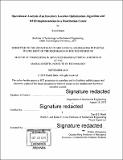Operational analysis of an inventory location optimization algorithm and RFID implementation in a distribution center
Author(s)
Batra, Rushil
DownloadFull printable version (14.92Mb)
Other Contributors
Massachusetts Institute of Technology. Department of Mechanical Engineering.
Advisor
David E. Hardt.
Terms of use
Metadata
Show full item recordAbstract
This thesis presents a strategic roadmap laid out for Waters Corporation, an analytical laboratory instrument company, and explores various avenues for digitalization, automation, optimization and standardization throughout its value chain. It then focuses on operational analysis of two pilot process improvement projects at their Global Distribution Center (GDC). Sub-optimal inventory placement caused by randomized assignment of primary storage locations is one of the key challenges faced by GDC. This often leads to inefficiencies in the form of unfulfilled orders as well as additional time and effort expended by material handlers. To cater to this problem, the first project revolves around the development of an inventory location optimization algorithm by taking into consideration the order frequency for a particular product and its distance from the shipping area. This work develops a mathematical formulation for assigning discrete storage location costs as an input for the algorithm by incorporating the nuances of current operating procedures. Preliminary estimates point toward savings of around 5% in walking time. While the aforementioned algorithm improves efficiency for put-away and retrieval of products, GDC requires better technology to track inventory and tackle the challenge effectively. Radio Frequency Identification (RFID) is an Automatic Identification (Auto-ID) technology popular for reading multiple tags at once and not requiring line of sight and. Its implementation was selected as the second pilot project for its ability to better manage inventory, reduce dock-to-stock time, improve put-away and shipping accuracy thereby directly impacting rate and quality of order fulfillment. The estimates suggest a reduction of over 20% in receiving time and 80% in time taken for inventory cycle counts besides drastic improvement in process accuracy. This work analyses the impact of both projects on the existing business processes by assessing the as-is state and proposing a future state after full-scale implementation. RFID has seen limited implementation in the industry owing to complexity in estimating the added value. The suitability of RFID application for inventory management in GDC is demonstrated through a cost-benefit analysis and Net Present Value (NPV). While there are significant costs associated with the technology, the range of applications and benefits derived strengthen the case for its implementation.
Description
Thesis: M. Eng. in Advanced Manufacturing and Design, Massachusetts Institute of Technology, Department of Mechanical Engineering, 2018. Cataloged from PDF version of thesis. Includes bibliographical references (pages 103-105).
Date issued
2018Department
Massachusetts Institute of Technology. Department of Mechanical EngineeringPublisher
Massachusetts Institute of Technology
Keywords
Mechanical Engineering.